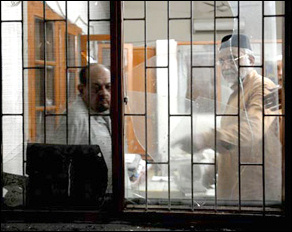Prisoners of conscience
by GUEST on 06 11th, 2010 |
 How many of us have experienced prejudiced discrimination and prejudice first hand?
How many of us have experienced prejudiced discrimination and prejudice first hand?Post 9/11, Pakistanis are often subjected to random security checks, prolonged questionings and distrusting stares at international airports, not to mention an unspoken, unwritten “discouraging policy” for visa applicants wishing to study or travel abroad, despite legitimacy of the applications. Being misjudged and misunderstood abroad has become the norm and we complain, we point fingers at the unfairness of the system and we sit back disgruntled and frustrated, unable to change anything.
Here, we’re touching the surface of the iceberg that symbolises the disillusionment Ahmedis have to live with, in every walk of life. Saying you’re Ahmedi elicits a reaction one would expect to get if they just confessed harbouring a contagious disease. It begins with school where your first run-ins with blatant discrimination and ill treatment are with misguided students and misinformed teachers who sadly make no effort to question the archaic laws of the state and instead skip over religious questions regarding Ahmedi beliefs and even accomplishments of Sir Zafrullah Khan or Dr Abdus Salam absent from Pakistan studies textbooks.
I still remember samples from the buffet of reactions I have received over the years, “my parents say you’re really nice but my grandmothers scared about you influencing or brainwashing me so I think its best if we keep a distance.” As you get older the rebuttals aren’t as polite or restrained. Young boys often have to put up with insults, derogatory remarks and unbearable comments from immature colleagues at schools and colleges. Young women cite the “in-laws don’t want me associating with Qadianis” and break off childhood friendships and associations after marriage. Personal disappointments might sound trivial but they represent a much larger social disease.
Unwritten rules are enforced in governmental jobs and institutions particularly the armed forces where its acceptable to have an Ahmedi soldier or general lead from the front, risk or lose his life, but not acceptable to award due promotions or accolades, but instead early retirements are encouraged by posting Ahmedi servicemen to ’sideline’ positions till they are left with no other choice. They are sent home with pats on the back by supportive seniors who say, “We wish things could have been different, no one deserved it more than you”.
One cannot even begin to understand the enormity of the security threat Ahmedi families are faced with everyday. All it takes is one trigger-happy lunatic or a group of narrow-minded opportunists and we hear the announcement at Friday prayers about another Ahmedi arrested or slain. A large portion of the Hindus and Christians have fled from Pakistan for safer pastures and yet some of the obstinate ones, including Ahmedis, choose to remain. Some might say it’s foolish on their part to expect any different from a repressed and misdirected society others might admire their steadfastness. Either way those who remain after each murderous attack and unjust conviction, make a choice; a choice to stand their ground to be recognised by the people, by the state for what they believe in.
Almost all repressed factions in countries world-wide react, often militarily, against the aggressors and the state. There are estimated to be more Ahmedis in Pakistan than there are Jews in Israel and Kurds in Iraq. The Jews since as far back as we can remember have never shied away from defying every international law and human rights directives to achieve its goal in establishing its homeland at the cost of thousands and thousands of Palestinian lives, but are plagued with the unending Hamas problem. The Kurds on the other hand have been dealt massive blows by multiple regimes, the British, the Iranians and the Iraqis and in spite of various attempts to reach a workable compromise they sporadically return to a military resistance upon failure of talks. The point is, based on religious differences history is filled with plenty of examples where the suppressed have either taken on arms or been a constant threat to the stability of their own nation or peaceful existence of others. Can Ahmedis be found guilty of either?
It would be foolish to assume that the writ of the opportunistic religious parties will not lose steam in the years to come. The attitude of the people in power towards the religious ones changes as often as the power tariffs in Pakistan. As global factors evolve so shall we, beyond the war on terror, beyond the economic and civic regression we are trapped in, beyond the baseless jihadists who either need to be absorbed or expelled from our soil.
In the meantime, Ahmedis will continue to bury their own and conform to the laws of the state while maintaining their own dignity and self-preservation. While the rest of the educated enlightened lot should ask themselves, each time they shy away from discussion with an Ahmedi acquaintance afraid to unravel years of misunderstandings, each time they sign the infamous box on the passport form (a practice that exists in no other country might I add) and each time they find themselves thinking there must be something wrong with them, to incur this kind of wrath. To the ill-advised neighbour who hurled and shouted hurtful derogatory remarks at me not too long ago at a children’s park about the founder of my community, I ask, as a prisoner of conscience in the country I was born in and plan to die in, mine is clean, how about yours?
Zainab Mahmood contributed for Dawn.com
©2010 DAWN Media Group. All rights reserved









